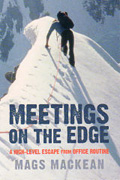Unjustifiable Risk? – The Story of British Climbing
CHF 45.80 incl. MwSt.
A social, economic and cultural history of British rock climbing and
mountaineering charting the conditions that gave rise to the sport, and the
achievements and motives of those who have shaped its development over 200
years. Today’s climbers share a desire to escape from urban society but what
makes them take that unjustifiable risk?
To an impartial observer, Britain does not appear to have any mountains. Yet
the British invented the sport of mountain climbing and for two periods in
history British climbers led the world in the pursuit of this beautiful and
dangerous obsession. Unjustifiable Risk? is the story of the social, economic
and cultural conditions that gave rise to the sport, and the achievements and
motives of the scientists and poets, parsons and anarchists, villains and
judges, ascetics and drunks that have shaped its development over the past two
hundred years.
Climbing has both reflected and influenced changing social attitudes to nature
and beauty, heroism and death. Over the years, increasing wealth, leisure and
mobility have gradually transformed the sport from an activity undertaken by
an eccentric and privileged minority into a popular part of the leisure and
tourist industry. But while much has changed, even more has remained the same.
Today’s climbers would be instantly recognisable to their Victorian
predecessors, with their desire to escape from the crowded complexity of urban
life, and willingness to take potentially unjustifiable risks in pursuit of
beauty, adventure and self-fulfilment.
| Region | |
|---|---|
| Erscheinungsjahr | |
| Sprache | |
| Autor |
Recommendations on the topic
Documentations
Documentations
Documentations
Documentations
Documentations
Documentations









